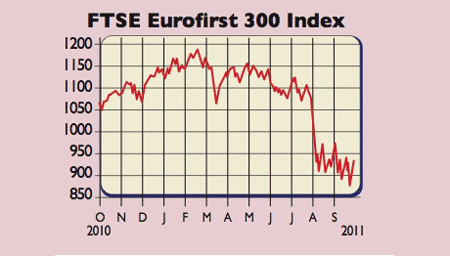
Talk of bold new measures to tackle Europe’s debt crisis gave markets a lift this week. One idea that emerged from last weekend’s IMF meetings was expanding the size of the eurozone rescue fund, the European Financial Stability Facility (EFSF) from €440bn to €2trn by leveraging its assets. Another was setting aside some of that money to recapitalise weak European banks so that they could deal with peripheral defaults. Finally, Greece might be allowed to write off half its debt load. All this propelled European stocks to their best one-day gain since May 2010 on Tuesday.
But by mid-week progress seemed as elusive as ever. Germany declared that no further expansion in the EFSF was planned. The prospect of Greece soon receiving its latest tranche of bail-out money receded after Athens said it would not pass much of the legislation needed to implement a new austerity package until later this month. There were also calls to revisit part of a summer deal that foresees private bondholders taking a loss on Greek bonds. Some countries want creditors to take a bigger haircut.
What the commentators said
This crisis makes me feel “both terrified and bored”, said Paul Krugman in The New York Times. On the one hand, the euro’s existence is under threat, given that an uncontrolled Greek default could rapidly spread to the rest of the periphery and trigger a global banking crisis. Yet at the same time, all we get from policymakers is “more of the same”.
That was certainly true this week, said WSJ.com. The “first glimpse of real hope for containing the crisis… immediately sank into the tar pit of European decision-making”. It seems that the main advocates of the new measures were international bureaucrats who don’t have to worry about being re-elected. Governments were clearly loath to sell big new plans to electorates “already grumbling” about propping up southern states.
The political response to the crisis has been like eternity in slow motion, said Wolfgang Munchau in the FT. The second Greek bail-out package, which includes beefing up the EFSF to €440bn, has yet to be ratified by some parliaments. Yet it’s already out of date. And Greece could soon give up on austerity. “Do we really believe” that the government can push through one package after another with a majority of five? Europe needs “a massive, ambitious policy to avoid a catastrophic financial scenario”, said Economist.com. But it’s increasingly unlikely that policymakers can develop one and muster the domestic support to ratify and implement it. Europe and the world thus face “a very dark economic reality”.